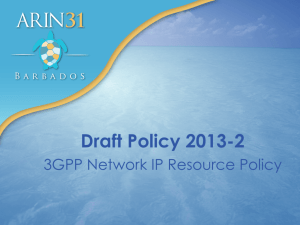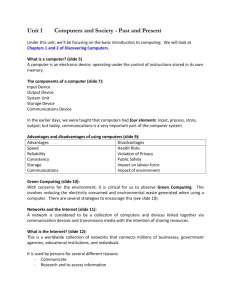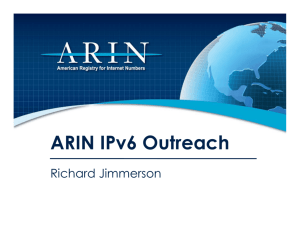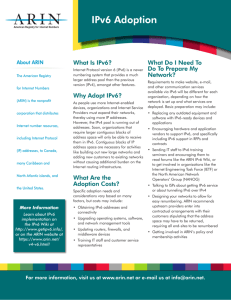XPP-PDF Support Utility
advertisement
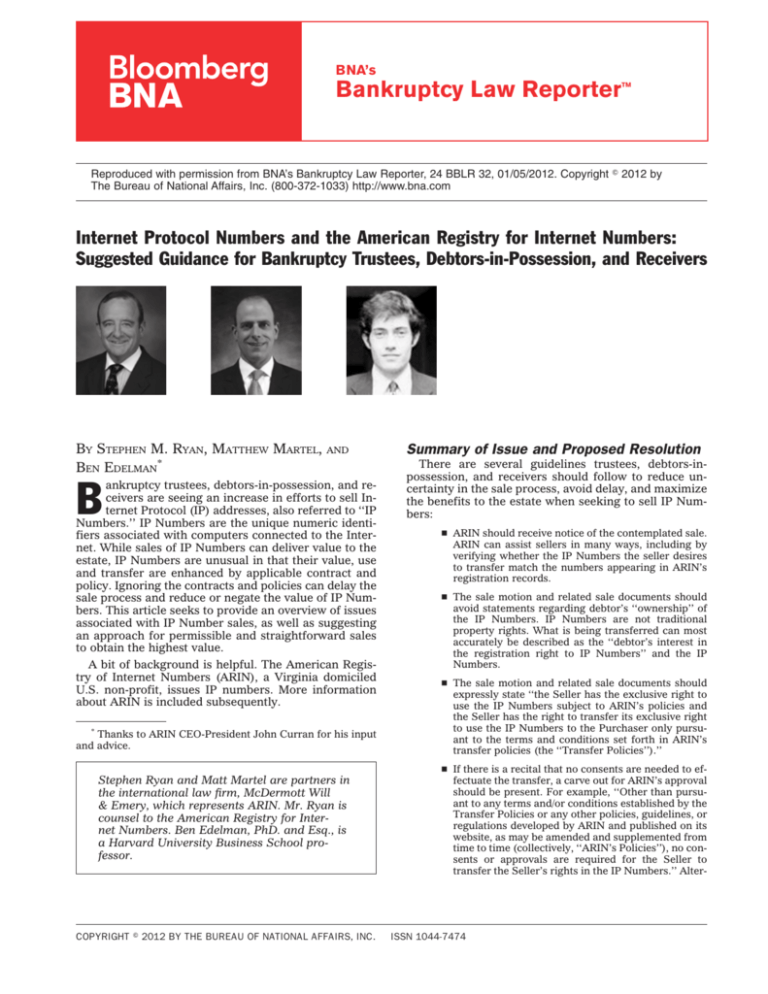
BNA’s Bankruptcy Law Reporter™ Reproduced with permission from BNA’s Bankruptcy Law Reporter, 24 BBLR 32, 01/05/2012. Copyright 姝 2012 by The Bureau of National Affairs, Inc. (800-372-1033) http://www.bna.com Internet Protocol Numbers and the American Registry for Internet Numbers: Suggested Guidance for Bankruptcy Trustees, Debtors-in-Possession, and Receivers BY STEPHEN M. RYAN, MATTHEW MARTEL, BEN EDELMAN* AND ankruptcy trustees, debtors-in-possession, and receivers are seeing an increase in efforts to sell Internet Protocol (IP) addresses, also referred to ‘‘IP Numbers.’’ IP Numbers are the unique numeric identifiers associated with computers connected to the Internet. While sales of IP Numbers can deliver value to the estate, IP Numbers are unusual in that their value, use and transfer are enhanced by applicable contract and policy. Ignoring the contracts and policies can delay the sale process and reduce or negate the value of IP Numbers. This article seeks to provide an overview of issues associated with IP Number sales, as well as suggesting an approach for permissible and straightforward sales to obtain the highest value. A bit of background is helpful. The American Registry of Internet Numbers (ARIN), a Virginia domiciled U.S. non-profit, issues IP numbers. More information about ARIN is included subsequently. B * Thanks to ARIN CEO-President John Curran for his input and advice. Stephen Ryan and Matt Martel are partners in the international law firm, McDermott Will & Emery, which represents ARIN. Mr. Ryan is counsel to the American Registry for Internet Numbers. Ben Edelman, PhD. and Esq., is a Harvard University Business School professor. COPYRIGHT 姝 2012 BY THE BUREAU OF NATIONAL AFFAIRS, INC. Summary of Issue and Proposed Resolution There are several guidelines trustees, debtors-inpossession, and receivers should follow to reduce uncertainty in the sale process, avoid delay, and maximize the benefits to the estate when seeking to sell IP Numbers: s ARIN should receive notice of the contemplated sale. ARIN can assist sellers in many ways, including by verifying whether the IP Numbers the seller desires to transfer match the numbers appearing in ARIN’s registration records. s The sale motion and related sale documents should avoid statements regarding debtor’s ‘‘ownership’’ of the IP Numbers. IP Numbers are not traditional property rights. What is being transferred can most accurately be described as the ‘‘debtor’s interest in the registration right to IP Numbers’’ and the IP Numbers. s The sale motion and related sale documents should expressly state ‘‘the Seller has the exclusive right to use the IP Numbers subject to ARIN’s policies and the Seller has the right to transfer its exclusive right to use the IP Numbers to the Purchaser only pursuant to the terms and conditions set forth in ARIN’s transfer policies (the ‘‘Transfer Policies’’).’’ s If there is a recital that no consents are needed to effectuate the transfer, a carve out for ARIN’s approval should be present. For example, ‘‘Other than pursuant to any terms and/or conditions established by the Transfer Policies or any other policies, guidelines, or regulations developed by ARIN and published on its website, as may be amended and supplemented from time to time (collectively, ‘‘ARIN’s Policies’’), no consents or approvals are required for the Seller to transfer the Seller’s rights in the IP Numbers.’’ Alter- ISSN 1044-7474 2 natively, ARIN’s approval may be sought in advance to allow a statement that no further consents are needed to effectuate the transfer. s In bankruptcy cases, if a sale free and clear is contemplated, there should also be a recital that IP Numbers cannot be transferred free and clear of ARIN’s Policies pursuant to Section 363 of the Bankruptcy Code. For example, ‘‘ARIN’s Policies do not constitute interests the Seller may sell free and clear of pursuant to Section 363(f) of the Bankruptcy Code and, as such, the transfer of the IP Numbers authorized pursuant to this Order shall not be free and clear of ARIN’s Policies.’’ s The sale documents should state that no transfer will occur until the purchaser complies with ARIN’s policies. For example, the sale order should state ‘‘The Seller and Purchaser are required to comply with ARIN’s policies before any transfer of the Seller’s rights may be effectuated, and nothing in this Order is intended, nor shall be construed, as exempting the Seller and Purchaser from complying with those policies.’’ s Prior to consummation of the sale, ARIN can assist the seller and purchaser in determining whether the purchaser can qualify for a transfer of the rights to use the IP Numbers. The Purpose and Function of IP Numbers IP Numbers are critical to the reliable operation of the Internet: Every device connected to the Internet needs a unique IP Number in order to send and receive information to/from others. The use of the same unique IP Number by two or more purported registrants would cause unreliable Internet service or no Internet service at all. Proper stewardship of IP Numbers is necessary to assure that IP Numbers are assigned uniquely. At present, the vast majority of the Internet uses the Internet Protocol version 4 (IPv4) numbering system, which has a limited capacity of approximately 4.2 billion unique numbers which was established in the earliest days of the Internet. A new standard, Internet Protocol version 6 (IPv6), promises increased capacity, but is not yet widely in use. Due to the remarkable success of the Internet, the IPv4 numbers have been nearly fully allocated and as a result, unused IPv4 numbers are becoming scarce. It is therefore increasingly important that available IPv4 numbers are used prudently and efficiently for the public good, and this demand to put underutilized IP numbers into productive use can be beneficial in monetizing these IP Numbers. The Role of ARIN in Allocating IP Numbers The American Registry for Internet Numbers is the non-profit corporation that oversees the allocation of Internet Protocol numbers and performs other services related to the operation and advancement of the Internet in the North American service region, including the U.S., Canada and certain Caribbean islands. ARIN is one of five Regional Internet Registries (RIRs); other RIRs perform similar services in other regions. ARIN carries out duties originally assigned to it by the U.S. Government that had been performed by the government. In particular, effective December 1, 1997, the National Science Foundation (NSF) approved the ‘‘transfer [of] responsibility for the IP Number assignment . . . to ARIN.’’ (See NSF Amendment No. 07 to Cooperative Agreement No. NCR-9218742.) Attachment A 1-5-12 chronicles the delegation of authority from the U.S. government to ARIN in greater detail. NSF recognized that the formation of an ARIN, as an industry selfgovernance body, was necessary in order to ‘‘give the users of IP numbers (mostly Internet service providers, corporations and other large institutions) a voice in the policies by which they are managed and allocated within the North American region’’ (See NSF Press Release: http://www.nsf.gov/news/news_summ.jsp?cntn_ id=102819). ARIN provides a variety of functions to coordinate the proper functioning of IP Numbers. For example, ARIN assures that each IP Number is assigned for use by at most one network. ARIN provides appropriate public records including a ‘‘WHOIS’’ public listing of the authorized user of each IP Number; accurate and up-to-date records are crucial so that any entity (be it an ordinary consumer, a network engineer, or law enforcement officer) can determine who is responsible for a given IP Number. Consistent with its commitment to its members and to the U.S. government, ARIN is obliged to manage IP Number registrations in a responsible and impartial manner in accordance with the policies democratically developed by the Internet community. In furtherance of this mission, ARIN members and interested parties in the community establish consensus policies that apply to the allocation and management of IP Numbers. These policies have significant implications for successful operation of the Internet, since IP Numbers are used to connect customers to the Internet, and with the interconnection of each IP Number to the Internet there are technical repercussions for all Internet service providers globally. The ARIN policies reflect the multiple interests that exist in the management of the IP numbers, including the registrant, the network operator community, and governmental interests in areas such as law enforcement and cybersecurity. ARIN’s Policies on the Transfer of IP Numbers Among these policies are ARIN’s policies on the transfer of registration rights in IP Numbers, the Transfer Policies. The Transfer Policies allow those holding registration rights in IP Numbers to transfer interests in such IP Numbers to a new party under certain circumstances. The Transfer Policies establish two methods by which registration rights in IP Numbers may be transferred. First, transfers may occur upon a merger or acquisition. That policy may apply if a buyer acquires network hardware, customer lists, or other assets from the estate. However, that policy does not apply to sale of IP Numbers separate from an estate’s other resources. Second, ARIN allows a transfer to a specific recipient (specified transfer), chosen by the then-current registrant of the IP Numbers, typically upon payment of a fee from the recipient to the registrant. ARIN policy provides that specified transfers are subject to requirements: (a) the recipient demonstrates a justified need for the IP Numbers; (b) the recipient demonstrates that it will actually use the IP numbers rather than hold the IP numbers for use at a later point in time; (c) the recipient is based in ARIN’s service area2; and (d) the recipient signs an appropriate contract, an ARIN ‘‘Regis2 A current policy proposal that is likely to be adopted may permit an inter-region transfer. COPYRIGHT 姝 2012 BY THE BUREAU OF NATIONAL AFFAIRS, INC. BBLR ISSN 1044-7474 3 tration Services Agreement’’ (RSA), affirming compliance with applicable policies. (There are over 11,000 such agreements entered into by more than 3,500 entities, including agencies of the U.S. Government.) ARIN’s transfer requirements apply to sellers in bankruptcy and receivership. IP Numbers are not the ‘‘property’’ of the entity that has the right to use the IP Numbers. Rather, upon assignment of IP Numbers, an entity receives the right to use those IP Numbers to the exclusion of all other parties, as well as the right to the various benefits that ARIN provides, such as the maintenance of the WHOIS database. ARIN Policies are part of the bundle of rights and services associated with an entity’s interest in IP Numbers. More than 3,500 networks or ‘‘end user’’ corporations have affirmatively agreed that IP Numbers are not ‘‘property.’’ In particular, the current ARIN RSA contract specifically provides: ‘‘Applicant acknowledges and agrees that the number resources are not property (real, personal, or intellectual) and that Applicant does not acquire any property rights in or to any number resources by virtue of this Agreement or otherwise.’’3 See also Attachment B, which presents relevant authority as to ARIN’s role in setting rules for the allocation and management of IP addresses, including judicial findings as well as statements of policy of the U.S. and Canadian governments. Some IP Numbers were issued before ARIN’s formation (legacy numbers) and before the standardization of RSA contracts clarifying networks’ rights and responsibilities. Nonetheless, as detailed above and in Attachment B, ARIN believes transfers of legacy numbers remain subject to key ARIN policies while acknowledging that there is no written contract between ARIN and the legacy holder. In particular, the management of existing number resources according to communitydeveloped policies is necessary for fulfillment of the self-governance goals for which ARIN was established. Compliance with ARIN Policies Is Consistent With Achieving the Highest Value for the Estate A trustee, debtor-in-possession, or receiver selling its rights to IP Numbers is likely to maximize its recovery by complying with applicable ARIN policies. An organization buying rights to IP Numbers will build its business on those resources—making implementation decisions that, in most instances, can be changed only with considerable effort and delay. Disputed or unreliable IP Numbers are therefore unappealing to sophisticated buyers who operate lawfully, and accounting for the interests of such buyers is crucial to obtaining full value for the estate. Full compliance with ARIN policies can help attract large buyers and obtain the greatest value for the IP Numbers. The ARIN community includes numerous organizations with substantial need for IP Numbers. A seller offering addresses consistent with ARIN policy will typically enjoy interest from these buyers, and their interest will tend to bid up prices to a higher level than a seller operating independent of ARIN. ARIN also operates a ‘‘listing service’’ whereby buyers and sellers can find each other. These considerations further demon3 RSA version 10.2, March 10, 2011. https://www.arin.net/ resources/agreements/rsa.pdf. BANKRUPTCY LAW REPORTER ISSN 1044-7474 strate the importance of compliance with ARIN policies in order for sellers to obtain the greatest value for their IP Numbers. ARIN’s Request to Trustees, Debtors-in-Possession, and Receivers ARIN is aware that debtors are increasingly seeking to sell their interests in IP Numbers. ARIN believes that many trustees, debtors-in-possession, and trustees may be unfamiliar with the nature and function of IP Numbers and with ARIN and applicable ARIN policies. ARIN welcomes the opportunity to assist sellers and potential buyers in these regards. As a threshold matter, ARIN believes it must receive notice of bankruptcy and receivership proceedings wherein a debtor seeks to transfer its IP Numbers. Such transfers can occur only in compliance with ARIN policies, and resources may be unusable if the proper transfer process is not followed. Notice to ARIN is necessary so that ARIN can advise parties of applicable requirements. Second, the sale motion and other sale documentation should avoid references to the estate’s ‘‘ownership’’ of the IP Numbers as such references tend to mislead potential buyers as to the nature of what they are acquiring in the sale process. Third, the sale documentation should state clearly that the seller’s rights to the IP Numbers can be sold only in accordance with ARIN’s Transfer Policies. Fourth, the sale documents should avoid blanket statements that no third party consents are necessary to effectuate a transfer or, alternatively, should expressly carve out ARIN’s Transfer Policies in the third party consent provisions of such sale documents. Fifth, if a sale free and clear of the interests of others is contemplated pursuant to Section 363(f) of the Bankruptcy Code, ARIN’s Transfer Policies must be carved out of such provisions. Finally, putting potential purchasers in touch with ARIN prior to consummation of the sale can assist all parties in determining whether the purchasers qualify for a transfer under ARIN Policies, thereby reducing uncertainty to sellers and purchasers. Recent proceedings further reveal valuable benefits that result from ARIN’s participation throughout the process: helping the estate obtain the greatest possible value, clarifying parties’ rights and obligations, reducing litigation complexity, and advancing judicial economy. ARIN believes these benefits accrue most readily if ARIN becomes involved as close as possible to the commencement of each sale of IP Numbers. In contrast, when ARIN learns of a sale only at or near the close of the transaction, ARIN has found that additional motion practice and delay are nearly inevitable, resulting in increased costs to the estate as well as additional burden on the court. ARIN appreciates the interest and support of trustees, debtors-in-possession, and receivers in selling rights to IP Numbers to the buyers who value them most. ARIN looks forward to assisting in achieving that important objective. BNA 1-5-12 4 Attachment A Additional Information Regarding the Delegation of Authority From the U.S. Government to ARIN The Internet is an outgrowth of the U.S. government’s financial investment in communications networks carried out under agreements with the Defense Advanced Research Projects Agency and the National Science Foundation (NSF). To maintain globally unique IP Numbers and conserve the finite number of them, the United States government established a system for allocating and managing IP Numbers. From 1987 to 1991, the U.S. government delegated the authority to register IP Numbers to IANA. In 1992, the NSF, pursuant to its authority over the Internet under 42 U.S.C. §§ 1862(a)(4)4 and (g),5 solicited and received bids for private companies to perform various functions for the Internet community, including registration services. At the outset, NSF awarded the contract to perform various Internet functions, including certain aspects of the registration of IP Numbers, to Network Solutions, Inc. (NSI) pursuant to a five-year cooperative agreement (the Cooperative Agreement) under the Federal Grants and Cooperative Act, 31 U.S.C. § 6301 et seq. As a result, NSI took over the function of registering IP Numbers from IANA on January 1, 1993. The explosion in the use of the Internet, probably not foreseen by NSF or most others, caused an unacceptable financial and administrative burden on NSF. NSI developed a plan for NSF to transfer the IP Number registration function to a nonprofit organization, and NSF agreed to this plan. Effective December 1, 1997, NSF approved the ‘‘transfer [of] responsibility for the IP Number assignment . . . to ARIN.’’ NSF Amendment No. 07 to Cooperative Agreement No. NCR-9218742. ARIN’s mission is to be responsible for the management of IP Numbers for all the geographic regions NSI administered under its Cooperative Agreement, as amended, with the NSF. On June 24, 1998 the NSF issued a press release announcing the formation of ARIN, entitled ‘‘Internet Moves toward Privatization, IP Numbers Handled by Non-Profit.’’ The press release stated, in pertinent part: The NSF has approved a plan from Network Solutions, Inc. (NSI) which establishes the American Registry for Internet Numbers (ARIN). Under the plan, ARIN would assume full responsibility for Internet Protocol (IP) number assignments and related administrative tasks previously handled by NSI. . . . The creation of ARIN is 4 42 U.S.C. § 1861 et seq. is the National Science Foundation Act. Section 1862(a)(4) provides that ‘‘[t]he [NSF] is authorized and directed—to foster and support the development and use of computer and other scientific and engineering methods and technologies, primarily for research and education in the sciences and engineering.’’ 11 U.S.C. § 1861(a)(4). 5 Section 1862(g) provides that ‘‘[i]n carrying out subsection (a)(4) of this section, the [NSF] is authorized to foster and support access by the research and education communities to computer networks which may be used substantially for purposes in addition to research and education in the sciences and engineering, if the additional uses will tend to increase the overall capabilities of the networks to support such research and education activities.’’ 11 U.S.C. § 1862(g). 1-5-12 consistent with the recommendations received from the Internet community at workshops over the past eighteen months, and with concurrence from a federal interagency working group. (emphasis added) Thus, the creation of ARIN was initiated and supervised by both the NTIA and NSF pursuant to NSF’s supervisory responsibility under the Cooperative Agreement. In addition, the United States Department of Commerce (DOC) granted the Internet Corporation for Assigned Names and Numbers (ICANN) responsibility for establishing, in conjunction with Internet users, policies for Internet Protocol Address Space, pursuant to a Memorandum of Understanding between the DOC and ICANN dated November 28, 1998, as amended May 25, 2001. In 1999, ICANN also assumed responsibility for the technical management functions previously performed by the U.S. government under contract with IANA, which has been renewed to the present day. The ICANN Memorandum of Understanding states (in part) that ICANN shall: Allocate Internet Numbering Resources—This function involves overall responsibility for allocated and unallocated IPv4 and IPv6 address space and Autonomous System Number space. It includes the responsibility for delegation of IP address blocks to regional registries for routine allocation, typically through downstream providers, to Internet end-users within the regions served by those registries. ARIN is one of the regional registries contemplated by the DOC’s contract with ICANN. As such, ARIN further derives its powers to oversee and allocate IP Numbers from ICANN’s agreement with the DOC. These actions of the United States government demonstrate an unbroken chain from the government to ARIN with respect to the management, allocation, and policies relating to IP Numbers. Attachment B ARIN’s Role in Setting Policy, as Affirmed by Courts and Regulators In a report issued in December 2010, the U.S. Federal Communications Commission stated its position that IP Numbers are not property. See FCC Staff Working Paper No. 3 at 5, December, 2010: RIRs [like ARIN] manage IP numbers as a public resource. When a registry allocates a number to an entity, it is giving that entity the ability to use that number; no property right is conferred to the recipient. IP numbers are allocated on a needs-basis pursuant to RIR policies; recipients pay fees which support the operation of the registries. Industry Canada is in accord. See Industry Canada’s April 13, 2011 filing in the Nortel Networks bankruptcy (In re Nortel Networks Inc. et al., D. Del. Case No. 0910138 (KG), docket #5253): This submission is in support of ARIN’s interventions related to the legal underpinnings of the current governance structure of Internet numbers . . . and to bring your attention substantive governmental and policy concerns that arise from the sale of Internet numbers in the manner and on the terms suggested in the Debtor’s Motion. . . . Their use in accordance with the policies adopted by ICANN, ARIN and the regional registries COPYRIGHT 姝 2012 BY THE BUREAU OF NATIONAL AFFAIRS, INC. BBLR ISSN 1044-7474 5 provides essential assurances respecting the ultimate identity and accountability of Internet users. In the Nortel bankruptcy matter, an appropriate voluntary resolution that satisfied all parties was reached. In a seminal case that has addressed the issue of whether IP Numbers are property, Kremen v. ARIN, No. 5:06-cv-02554-JW (N.D. Cal. April 12, 2006), the District Court rejected plaintiff’s request of a finding that IP Numbers were property. The Kremen court further af- BANKRUPTCY LAW REPORTER ISSN 1044-7474 firmed that IP Numbers are not property: ‘‘IP resources may only be transferred from one entity to another pursuant to the terms of ARIN’s Guidelines for Transferring Internet Protocol (IP) Space . . . and subject to ARIN’s Transfer Policy . . . Among other things, the Guidelines provide that IP resources are nontransferrable, may not be sold or assigned and may only be transferred upon ARIN’s approval of a formal transfer request.’’ (Id. at 3) BNA 1-5-12
